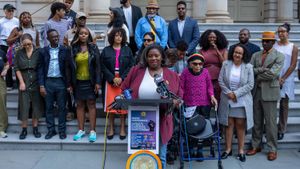Sean “Diddy” Combs has found himself embroiled in serious legal troubles as he stands accused of sex trafficking and related crimes. Combs, the 54-year-old hip-hop mogul known for his extravagant lifestyle and influence on the music industry, has been making headlines for his upcoming federal trial, which has sparked immense public and media interest. The stakes are high, with federal prosecutors alleging he was involved in running a criminal network engaging in sex trafficking and other violent crimes, including racketeering and bribery.
Combs’ situation escalated dramatically when he was arrested on September 16, facing multiple charges. Following his arrest, he was ordered to be held without bail due to the severity of the allegations against him—a 14-page indictment detailing how he allegedly abused, threatened, and coerced women to fulfill his sexual desires over many years. The indictment paints a picture of Combs as someone who created a criminal enterprise aimed at maintaining personal control over his activities, which the prosecution argues went beyond just personal misconduct.
Recently, Combs expressed eagerness to testify during his trial, according to his attorney, Marc Agnifilo. The defense team is preparing for possible cross-examination, which may open Combs up to scrutiny over allegations from former partners and other accusers. The comments from Agnifilo highlight his client's intent to take control of his narrative: “There is nothingthat could keep him off the stand. He is very eager to tell his own story.” This move, though bold, could prove to be risky as it subjects him to intense questioning from prosecutors.
Prosecutors, meanwhile, are not sitting idly. They have indicated Combs has tried to obstruct justice even from behind bars. Their filing alleges he had been reaching out to potential witnesses and attempting to sway public opinion to benefit his case and influence jury members. This includes reportedly directing family members to connect with certain individuals and encouraging online narratives to shape perceptions of the trial.
What’s more alarming for Combs is the accusation of violating prison regulations by attempting to communicate outside the sanctioned channels. U.S. Attorney's Office officials claim he has used phone accounts belonging to other inmates to make unauthorized calls, ostensibly to influence potential witnesses. This tactic would appear intended to evade the scrutiny of law enforcement overseeing inmate communications and could be seen as part of efforts to orchestrate his public relations strategy to woo potential jurors.
Details from the filings reveal specific instances where Combs allegedly broke jail rules, including instances where he instructed others to organize three-way calls, which is against Bureau of Prisons policy. The projections put forth by the prosecutors indicate not only challenges to the defense's narrative but demonstrate Combs' perceived disregard for judicial protocols.
The allegations extend beyond just attempting to influence witnesses; there are broader accusations about how Combs has purportedly leveraged funds to manipulate the situation. Prosecutors assert evidence was found indicating he paid certain witnesses to post favorable statements on social media platforms, seeking to cast doubt on the narratives against him.
Earlier accusations coincide with the dramatic fallout from his former relationship with singer Cassie Ventura. After Cassie filed suit against Combs alleging abuse, multiple other women came forward with similar allegations. This tidal wave of accusations highlights the gravity of the situation surrounding Combs, and his defense strategies are becoming increasingly complex as he faces mounting legal battles.
Combs’ already precarious legal position worsened with his time spent at the Metropolitan Detention Center (MDC) in Brooklyn, where he was reportedly placed on suicide watch following his arrest. The court records detail how following his arrest, he was not only facing criminal charges but additional scrutiny due to his alleged attempts to reach out to witnesses.
These developments have left many observers questioning the integrity of the judicial process and the lengths to which Combs may go to influence his trial. The case against him sets the stage for legal debates and public discourse about abuse, power, and accountability.
Interestingly, his defense continues to argue for his bail release, contending the claims put forth by prosecutors lack substance. They maintain the evidence against Combs is insufficient, asserting, “The evidence makes clear the government’s case is thin.” This approach is dual-edged, acknowledging the seriousness of the claims but simultaneously seeking to undermine them.
With his trial set to begin next May, the anticipation builds around how the dynamic within the courtroom will evolve. Observers are expectant, waiting to see if Combs' testimony will shift perceptions and how the prosecution's strategy will adapt to any assertions he makes on the stand.
Throughout proceedings, the existence of multiple civil lawsuits will also pose challenges for Combs. Many individuals—over 120 alleged victims—are taking action against him, creating a multifaceted legal situation. Each case presents unique challenges and potential settlements as plaintiffs seek redress for their stories of abuse and exploitation. This complex web of legal issues has left Combs' reputation hanging by a thread.
Beyond the courtroom drama lies the question of how his career and legacy may be perceived following these events. Given Diddy's substantial influence within the music industry and pop culture at large, there is speculation about the potential repercussions his trial may hold not just for him personally, but for the industry as a whole.
With all these legal battles and allegations swirling, supporters and detractors of Combs are divided as they await the upcoming trial. For some, he remains the music mogul who revolutionized hip-hop, but for others, he embodies more sinister elements of power and celebrity culture. Only time will tell how the scales of justice will sway as the evidence is presented and testimony is heard.
For now, Sean “Diddy” Combs remains behind bars as prosecutors push for stricter measures. The stakes through these upcoming court dates continue to rise, and Combs' fate hangs delicately as the judicial system grapples with allegations of abuse and the fight against the exploitation of power.



